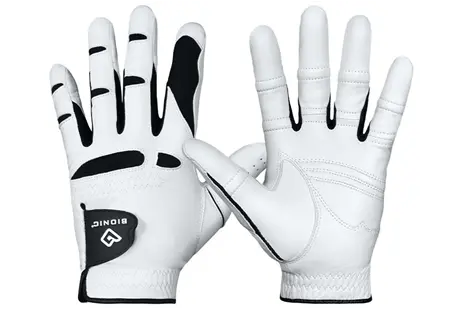What Should a Golfer Consider When Choosing a Glove?

Golf is a game of precision, finesse, and control, where every piece of equipment plays a crucial role in the overall performance of a golfer. Among the essential accessories is the golf glove, a seemingly simple yet vital component that directly impacts a golfer’s grip, comfort, and ultimately, their swing. Choosing the right glove for playing golf is not just about style; it involves a careful consideration of various factors to ensure an optimal playing experience. In this comprehensive guide, we will delve into the key aspects that golfers should contemplate when selecting a glove for the course.
Contents [show]
Material Matters:
One of the primary considerations when choosing a cool golf glove is the material. The two main types are leather and synthetic.
Leather Gloves:
Renowned for their unmatched softness and superior grip, leather gloves, particularly those made from Cabretta leather, are favored by many golfers. The natural feel of leather provides a connection between the golfer’s hand and the club, offering a responsive touch. However, leather gloves may require more care and are generally pricier.
Synthetic Gloves:
For those looking for a more affordable option or a glove that withstands the elements, synthetic gloves are a viable choice. They often offer better durability and resistance to moisture, making them suitable for various weather conditions. Additionally, synthetic gloves may require less maintenance compared to their leather counterparts.
The Perfect Fit:
Achieving the perfect fit is paramount for a golfer’s comfort and performance. A glove that is too loose can affect grip stability, while one that is too tight may cause discomfort and impact flexibility.
Sizing:
Consult the sizing chart provided by the manufacturer to determine the correct size for your hand. The glove should fit snugly, with the fingers reaching the end of the glove without excessive space. Keep in mind that sizes can vary between brands, so trying on different gloves is advisable.
Glove Hand and Closure Type:
The gloves are designed for specific hands – left or right. Ensure you choose the glove that corresponds to the hand you wear it on. Additionally, consider the closure type, with options such as hook-and-loop (Velcro), snap-button, and slip-on. The chosen closure should provide a secure fit and be easy to manage during your round.
Ventilation for Comfort:
Golf is a sport that often demands hours of play under the sun, making ventilation a crucial factor. Look for gloves with breathable materials or perforations that allow air circulation. Adequate ventilation helps prevent excessive sweating, keeping your hand cool and comfortable throughout the game.
Durability for Longevity:
Frequent golfers should pay attention to the durability of the glove material. While leather gloves are generally more durable, advancements in synthetic materials have led to the creation of durable and long-lasting options. Consider your playing frequency and conditions to determine the level of durability required.
Weather Conditions and All-Weather Performance:
Golfers should consider the prevalent weather conditions in their region. For rainy or humid climates, gloves with water-resistant or water-repellent properties can be advantageous. Some gloves are specifically designed for all-weather play, ensuring a consistent grip regardless of the elements.
Grip Enhancement:
The grip is a critical aspect of any cool golf gloves. A good glove should provide a secure grip on the club without being too sticky or too slippery. Some gloves feature textured palms, additional grip enhancements, or patterns designed to enhance the connection between the hand and the club.
Brand and Model Variations:
Different brands and models may offer variations in sizing, fit, and features. Golfers are encouraged to experiment with gloves from various brands to find the one that best suits their preferences. Some golfers may find a particular brand or model that aligns perfectly with their hand shape and playing style.
Budget Considerations:
Golf for playing gloves come in a range of price points, and while budget is a factor, it’s essential to consider the long-term benefits of investing in a quality glove. A good-quality glove can contribute to a better grip, improved performance, and enhanced durability.
Conclusion:
Choosing the right golf glove is a nuanced process that involves a careful consideration of material, fit, ventilation, durability, and other factors. The perfect glove varies from golfer to golfer, depending on personal preferences, playing style, and environmental conditions. By paying attention to these crucial aspects, golfers can ensure that they make an informed decision, ultimately enhancing their comfort and performance on the golf course.





